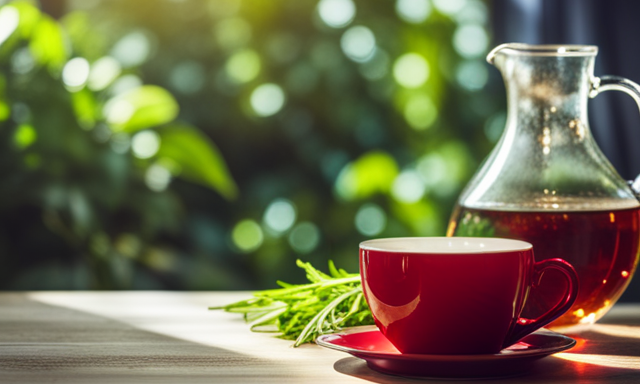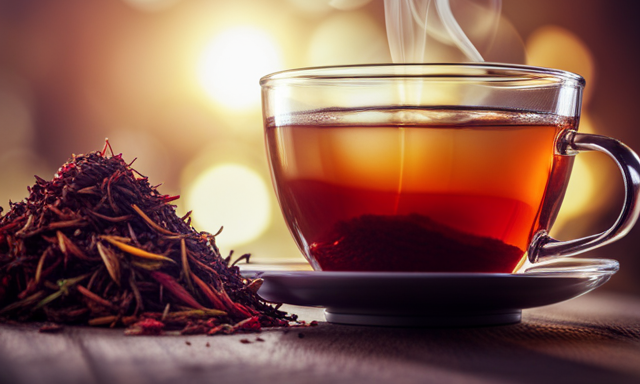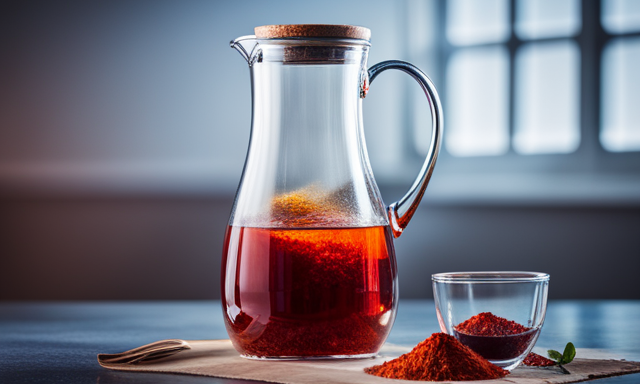Which is healthier, green tea or rooibos tea? That’s the question we’ll be exploring in this article.
As someone who values their health and is always seeking ways to improve it, I’ve often wondered which of these two popular teas is the better choice.
Green tea has long been hailed for its numerous health benefits, while rooibos tea has gained a reputation for its antioxidant properties. But which one truly reigns supreme?
In this article, we’ll delve into the nutritional profiles of both teas, examine their potential health benefits, compare their caffeine content, and explore their taste and flavor profiles.
We’ll also look at preparation and brewing methods, as well as any potential side effects and precautions to consider.
By the end, we hope to shed some light on this debate and help you make an informed decision based on your personal preference.
Key Takeaways
- Green tea and Rooibos tea have different flavor profiles, with green tea having a grassy and slightly bitter taste, and Rooibos tea having a sweet and nutty flavor.
- Both green tea and Rooibos tea have their own set of health benefits, with green tea having high levels of antioxidants and potential weight loss benefits, and Rooibos tea being naturally caffeine-free and containing antioxidants.
- Excessive consumption of green tea can lead to caffeine-related side effects like insomnia and increased heart rate, while Rooibos tea is generally safe but some individuals may experience allergic reactions.
- Personal preference and health goals should be considered when choosing between green tea and Rooibos tea, and it is advisable to consult with a healthcare professional or nutritionist for personalized advice.
Nutritional Profiles of Green Tea and Rooibos Tea
If you’re looking to boost your health, both green tea and rooibos tea offer unique nutritional profiles that can benefit your well-being. Green tea is known for its potential antioxidant properties, thanks to the presence of polyphenols such as catechins. These compounds have been shown to help reduce oxidative stress in the body and support overall health.
Compared to green tea, rooibos tea has lower levels of polyphenols, but it’s still a rich source of antioxidants. Rooibos tea contains unique antioxidants like aspalathin and nothofagin, which have been linked to potential health benefits, such as reducing inflammation and supporting heart health.
Transitioning into the subsequent section about the potential health benefits of green tea, it’s important to explore how these nutritional differences can affect overall well-being.
Potential Health Benefits of Green Tea
Green tea has a multitude of potential health benefits, making it a powerhouse beverage for overall well-being. It’s rich in antioxidants, which help to protect cells from damage caused by free radicals.
Additionally, green tea has been shown to boost metabolism and aid in weight loss. It may also help to reduce the risk of certain chronic diseases, such as heart disease and cancer.
Here are three key nutritional benefits of green tea:
-
High in catechins: Green tea is loaded with catechins, a type of antioxidant that’s been linked to a reduced risk of heart disease and certain types of cancer.
-
Boosts brain function: The caffeine and amino acid L-theanine in green tea can enhance brain function and improve mental alertness.
-
Supports weight management: Green tea has been shown to increase fat burning and boost metabolic rate, making it a valuable tool for weight management.
With its impressive nutritional profile and antioxidant properties, green tea is a wise choice for those seeking to improve their health.
Now, let’s explore the potential health benefits of rooibos tea.
Potential Health Benefits of Rooibos Tea
Rooibos tea, also known as red bush tea, offers potential health benefits that make it a great addition to any wellness routine. Firstly, it has been found to relieve allergies and asthma symptoms due to its anti-inflammatory properties.
Additionally, it supports digestive health by reducing inflammation in the gut and promoting healthy digestion.
Lastly, rooibos tea is known for promoting skin health, thanks to its high antioxidant content that helps protect the skin from damage caused by free radicals.
Relieving Allergies and Asthma
Relieving allergies and asthma can be a challenge, but there’s a tea that might just offer some relief. Rooibos tea, with its natural properties, has been found to have potential benefits in alleviating these conditions. Here are three reasons why it could be worth a try:
-
Anti-inflammatory properties: Rooibos tea contains antioxidants like quercetin and luteolin, which’ve anti-inflammatory effects. These compounds may help reduce the symptoms associated with allergies and asthma.
-
Antihistamine properties: Rooibos tea has been found to have antihistamine effects, which can help alleviate allergic reactions. Histamines’re responsible for triggering allergy symptoms, and by inhibiting their release, rooibos tea may provide relief.
-
Soothing effect: Rooibos tea’s known for its calming and soothing properties. This can be beneficial for individuals dealing with respiratory issues caused by allergies or asthma, as it may help relax airway muscles and reduce wheezing.
In addition to relieving allergies and asthma, rooibos tea also supports digestive health by promoting good gut bacteria.
Supporting Digestive Health
If you’re looking to support your digestive health, consider incorporating the benefits of rooibos tea into your daily routine. Rooibos tea is known for its natural remedies and probiotic benefits that can promote a healthy gut. It contains antioxidants and anti-inflammatory properties that can help soothe digestive issues such as bloating, indigestion, and stomach cramps.
Studies have shown that rooibos tea can also support the growth of beneficial gut bacteria, which is essential for a healthy digestive system. Additionally, rooibos tea is caffeine-free, making it a suitable option for those with sensitive stomachs. By including rooibos tea in your diet, you can enjoy its digestive benefits and improve your overall gut health.
Transitioning into the next section, let’s explore how rooibos tea can promote skin health without taking any additional steps.
Promoting Skin Health
With its soothing properties and rich antioxidants, incorporating rooibos tea into your daily routine can leave your skin glowing and rejuvenated. Rooibos tea is known for promoting anti-aging effects and improving skin elasticity.
The antioxidants in rooibos tea help fight against free radicals, which can contribute to premature aging and skin damage. These antioxidants also help to reduce inflammation, which can lead to a clearer complexion and improved skin tone.
Additionally, rooibos tea contains alpha hydroxy acid, which is known to promote the production of collagen and elastin, two proteins that are essential for maintaining youthful and supple skin. By including rooibos tea in your skincare routine, you can enjoy the benefits of healthier, more radiant skin.
Moving on to the next section about caffeine content, it’s important to consider the effects of caffeine on your overall health.
Caffeine Content
Sipping on a cup of green tea is like taking a leisurely stroll through a serene garden, while rooibos tea offers the same calming effect as curling up with a good book by the fireplace. When it comes to caffeine content, green tea contains approximately 25-29 milligrams of caffeine per 8-ounce serving, whereas rooibos tea is naturally caffeine-free. This makes green tea a better choice for those who prefer a slight energy boost without the jitters associated with higher caffeine consumption.
However, individuals with caffeine sensitivity may find rooibos tea more suitable for them, as it doesn’t contain any caffeine. Moving on to the next section about taste and flavor profile, both green tea and rooibos tea have distinct flavors that cater to different preferences.
Taste and Flavor Profile
When it comes to taste, green tea has a distinct grassy and slightly bitter flavor. It has a refreshing and light taste that can be described as vegetal or seaweed-like.
On the other hand, rooibos tea has a naturally sweet and nutty flavor, with hints of caramel and vanilla. It has a smooth and mellow taste that is often compared to black tea, but without the astringency.
Describing the Taste of Green Tea
Although many people find green tea to be slightly bitter, its unique taste is often described as refreshing and grassy. Green tea is known for its numerous health benefits, including its high antioxidant content and potential to improve brain function.
Some of the key benefits of green tea include reducing the risk of heart disease, lowering blood pressure, and aiding in weight loss. Additionally, green tea contains compounds that may help protect against certain types of cancer. Its taste is enhanced by brewing it at the correct temperature and for the appropriate duration.
Transitioning to the subsequent section, describing the taste of rooibos tea, it’s important to explore the flavors and characteristics of this herbal tea.
Describing the Taste of Rooibos Tea
To truly appreciate the taste of Rooibos tea, you’ll be transported to the vibrant and colorful landscapes of South Africa, where this beloved herbal infusion is enjoyed by millions.
The aroma of Rooibos tea can be described as sweet, earthy, and slightly nutty. It has a unique flavor profile that sets it apart from other herbal teas. Unlike green tea, which can sometimes have a grassy or vegetal taste, Rooibos tea offers a smoother and sweeter experience. It’s naturally caffeine-free and contains antioxidants, making it a popular choice for those looking for a healthier alternative.
When compared to other herbal teas, Rooibos stands out with its distinct flavor and aroma.
Now, let’s move on to the next section and talk about the preparation and brewing methods.
Preparation and Brewing Methods
One way to unleash the full potential of both green and rooibos tea is by exploring different brewing methods. The way we prepare and brew tea can greatly affect its taste, aroma, and potential health benefits. There are various preparation techniques and brewing equipment that can be used to make the perfect cup of tea. For green tea, it is recommended to use water that is around 175°F to 185°F and steep it for 2-3 minutes. On the other hand, rooibos tea can be brewed using boiling water and steeped for 5-7 minutes. It is important to note that over-brewing tea can result in a bitter taste, so it is crucial to follow the recommended brewing times. By understanding the different brewing methods, we can enjoy the unique flavors and potential health benefits of both green and rooibos tea. Now let’s explore the potential side effects and precautions associated with consuming these teas.
Potential Side Effects and Precautions
Be careful not to steep your tea for too long, as it could leave a bitter taste and potentially have negative effects on your health. While both green and rooibos tea offer numerous health benefits, it’s important to be aware of their potential side effects and take necessary precautions.
When consumed in excess, green tea can lead to caffeine-related side effects like insomnia, increased heart rate, and digestive issues. On the other hand, rooibos tea is generally considered safe, but some individuals may experience allergic reactions due to its high levels of polyphenols.
Additionally, long term effects of excessive tea consumption may include an increased risk of kidney stones and liver damage. It’s always advisable to consult with a healthcare professional before making any significant changes to your diet or lifestyle.
Moving on to the next section about ‘conclusion and personal preference’, it’s essential to consider all aspects of both teas to make an informed decision.
Conclusion and Personal Preference
In conclusion, both green tea and rooibos tea have their own set of health benefits and potential side effects. It’s important to consider personal preference when choosing between the two.
Green tea is known for its high levels of antioxidants and potential weight loss benefits. On the other hand, rooibos tea is caffeine-free and may help with digestion and sleep.
Ultimately, the decision between green tea and rooibos tea depends on individual taste and health goals. Some may prefer the grassy and slightly bitter taste of green tea, while others may enjoy the sweet and nutty flavor of rooibos tea.
It is recommended to consult with a healthcare professional or nutritionist to determine which tea is best suited for one’s specific needs and preferences.
Benefits of Green Tea:
- High levels of antioxidants
- Potential weight loss benefits
Benefits of Rooibos Tea:
- Caffeine-free
- May aid digestion and sleep
Frequently Asked Questions
Can green tea help with weight loss?
Yes, green tea can help with weight loss. It contains catechins that boost metabolism and increase fat burning. Studies suggest that consuming green tea regularly can aid in weight management.
How does rooibos tea help with allergies?
Rooibos tea benefits allergies by boosting the immune system. It contains antioxidants that help reduce inflammation and allergic reactions. It is a natural remedy that can provide relief from symptoms like sneezing and itching.
What are the potential side effects of drinking green tea?
I’ll discuss the potential side effects of drinking green tea. Some people may experience stomach upset, headaches, or sleep problems. Long-term effects of green tea consumption are still being studied, but it is generally considered safe in moderate amounts.
Can rooibos tea help lower blood pressure?
Sure! Rooibos tea has several benefits, including potentially helping to lower blood pressure. Studies have shown that it may have a positive effect on heart health, which is great news for those looking to improve their cardiovascular well-being.
What is the recommended daily intake of green tea for maximum health benefits?
The recommended daily intake of green tea for maximum health benefits varies, but studies suggest consuming 3-5 cups a day. Green tea is rich in antioxidants and may improve brain function, aid weight loss, and reduce the risk of chronic diseases.
Conclusion
After examining the nutritional profiles, health benefits, caffeine content, taste, preparation methods, and potential side effects of both green tea and rooibos tea, it’s clear that both teas offer numerous health benefits.
However, personal preference plays a crucial role in determining which tea is healthier. While green tea is known for its antioxidant properties and potential weight loss benefits, rooibos tea is rich in antioxidants and may help with digestion and skin health.
Ultimately, the choice between green tea and rooibos tea depends on individual taste and health goals.










